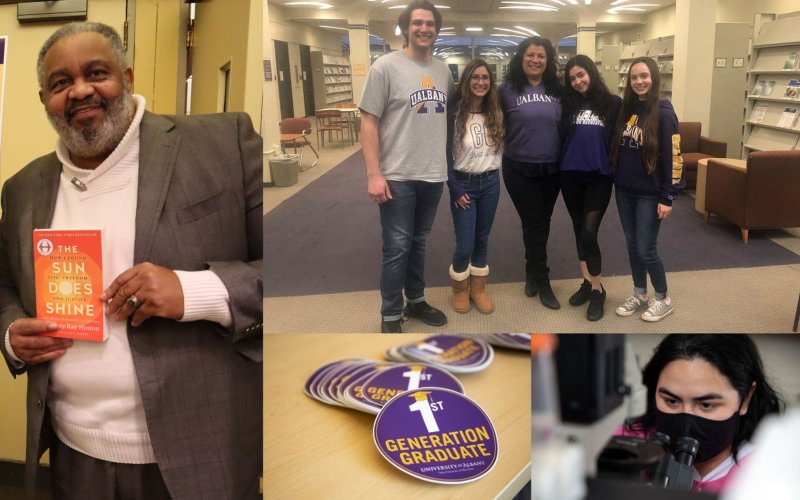Diversity Transformation Awards help promote equity at University

ALBANY, N.Y. (June 9, 2022) — A student podcast and a mentoring program for first generation students were among five programs that won Diversity Transformation Awards through the Office of Diversity and Inclusion. The awards, in the form of microgrants, are designed to promote greater equity for historically underrepresented and underserved groups within the University, as well as populations that have historically been marginalized.
The winners for the 2021-2022 academic year are:
The Equity in Education Summit, submitted by Tammy Ellis-Robinson, an assistant professor in Education & Counseling Psychology in the School of Education, and the school’s director of equity and inclusion.
The May 7 summit, titled “The Black and Brown Experience; A Summit for the Community,” was the culminating event created with a community of educators, undergraduates and graduate students in the Touhey Fellows program and School of Education, and area high school students. The group shared insights about experiences in schools and recommendations for working with and for students of color and promoting educational justice as advocates and/or future educators.
UAlbany Student Stories Podcast, submitted by Carmen Serano, associate professor in Languages, Literatures and Cultures and Latin American, Caribbean & U.S. Latino Studies.
The podcast series, produced by students, creates an archive of oral histories of students who often find themselves on the periphery of higher education and/or society, students for whom English is not their primary language, immigrants, minoritized communities, non-traditional college students, Dreamers, undocumented students, LGBTQ community members and allies, students with disabilities and military veterans.
“These podcasts are intended to create solidarity among listeners and will also become a powerful research and teaching tool that can contribute to building a more inclusive and sustainable society,” Serano said.
Read more about the podcast series.
Honors College Common Read and Author Visits, submitted by Linda Krzykowski, associate vice provost and executive director for student engagement.
This microgrant supported more than 250 Honors College students in engaging with critical topics on race, incarceration, the death penalty and others, and brought two prominent authors and activists — Anthony Ray Hinton and Alice Green — into a class taken by all incoming Honors College students. By engaging with these two authors and their respective books, students had the opportunity for better understand issues of social justice and be inspired to learn more through research and advocacy.
CAS Dean’s Scholars Fund, submitted by Jeanette Altarriba, dean of the College of Arts & Sciences.
The Dean’s Scholars Fund supports health-related biomedical research and aims to address the lack of diversity in the workforce. The grants will support evidence-based strategies that counter structural barriers impeding the success of students who are traditionally underrepresented in biomedical research and facilitate their transition to graduate training.
The first grants are expected to be awarded in the upcoming academic year to juniors and seniors in Biology, Chemistry and Psychology to defray the costs of attending conferences to present papers, and fees associated for tests and applications for graduate programs.
First Gen Scholars Mentor Programs, submitted by Clarence McNeill, dean of students.
The mentor program supports and connects first-generation college students with UAlbany staff and alumni who are either the first in their families to attend college or are allies. Since about one-third of UAlbany’s undergraduates are first generation students, many of whom struggle with racial disparities and socioeconomic challenges, the mentor program is designed to enhance equity and success by supporting first-gen scholars as they navigate university living and learning spaces.




